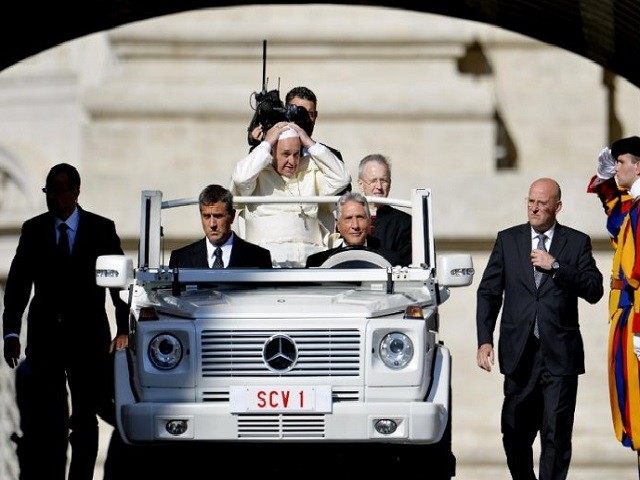In a rare interview, the head of the Vatican police force, or “Gendarmerie,” Commander Domenico Giani, said this weekend that the Islamic State (ISIS) threats against Pope Francis are “real” and not just media propaganda. “This is what emerges from the talks I have had with Italian and foreign colleagues,” he said.
Threats against the Pope and the Vatican go beyond the institutional Islamic State, said Giani, and extend to the risk of lone wolves, “which are more dangerous because they are unpredictable.” This includes everything from fanatics to the mentally disturbed to individuals who simply choose the Vatican as a venue for the media coverage that they can get, he said.
Giani has stood at the helm of the Vatican police for the past nine years, but he now faces an especially tense period in the face of the dramatic news coming from the Middle East and North Africa and explicit ISIS threats against the Pope and Rome.
According to the commander, Pope Francis is fully aware of the risk but “is not compromising the style of his pontificate, based on closeness to the people, that is, on personal contact with the greatest number of people possible.” Even as Pope, he said, Francis remains “the priest who does not want to lose touch with his flock.”
“We are the ones who have to adjust to him, and not vice versa,” Giani said. “We have to do everything we can so he can continue to carry out his ministry as he wants and believes he should.”
Giani says that the Pope is “well aware of the threats on his person,” but his only concern is “for the faithful.”
In terms of moments of extreme tension, Giani likens the present situation to 2006, when Pope Benedict gave his famous speech in Regensburg, Germany. He said that if we reread the Pope’s address today, it appears “prophetic” because of its firm denunciation of the “degeneration of extremist forms of Islam.” The address, he said, sparked protests and vehement threats against the Pope.
Under Giani’s command, the Vatican Police have joined Interpol and begun to exchange information with the intelligence services of other countries. He said that even from many Islamic countries he has received valuable information, as well as signs of esteem and admiration for the Pope. “I can say that today the Pope is seen and respected by Islam as the most influential moral authority in the world,” Giani said.
For years before serving the Vatican, Giani worked for the Italian government but says that his task now is the “highest of all.” As a believing Catholic, Giani says, “I protect the Vicar of Christ on earth,” which is “an honor and a joy that compensate every sacrifice, even the risk of my life.”
Yet even as a Catholic, Giani believes that the use of force has its place. “During his journey back from a visit to South Korea,” Giani said, “the Holy Father said it is permissible to stop unjust aggression,” though this should never be taken lightly. “Even for us Gendarmerie, weapons should be used only as the last resort,” he said.
There are currently 138 Vatican police, which, according to Gianni, are too few. “Budget constraints and austerity have hit the Vatican as well,” he said. There is no lack of interest however. In the last hiring, he said, in which 20 new seats were available, a thousand applicants showed up to be interviewed.
According to Giani, 20 of the 138 Vatican police have received “special training” that makes them suitable also for “anti-terrorist actions.” Some of these men, he said, “accompany the Pope during his international travels.”
Giani also clarified the distinction of tasks between the Swiss Guard and the Vatican Police. The Guard, he said, made up of 110 soldiers, has “the task of defending the person of the Holy Father and his residences.” The Vatican Police, on the other hand, is responsible for dealing “with the overall security of the Vatican City State, and the Holy Father’s movements. It also performs the functions of the judicial police,” he stated.
According to Giani, the Vatican makes use of the latest security technology and has an operational center “of high technological level,” which is supplied by “thousands of surveillance cameras” installed in Vatican City, as well as in extraterritorial Vatican properties.
Follow Thomas D. Williams on Twitter @tdwilliamstrome.

COMMENTS
Please let us know if you're having issues with commenting.